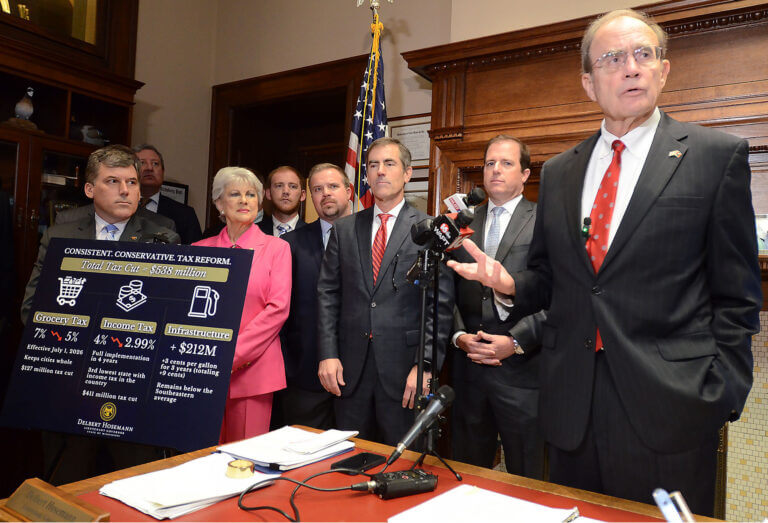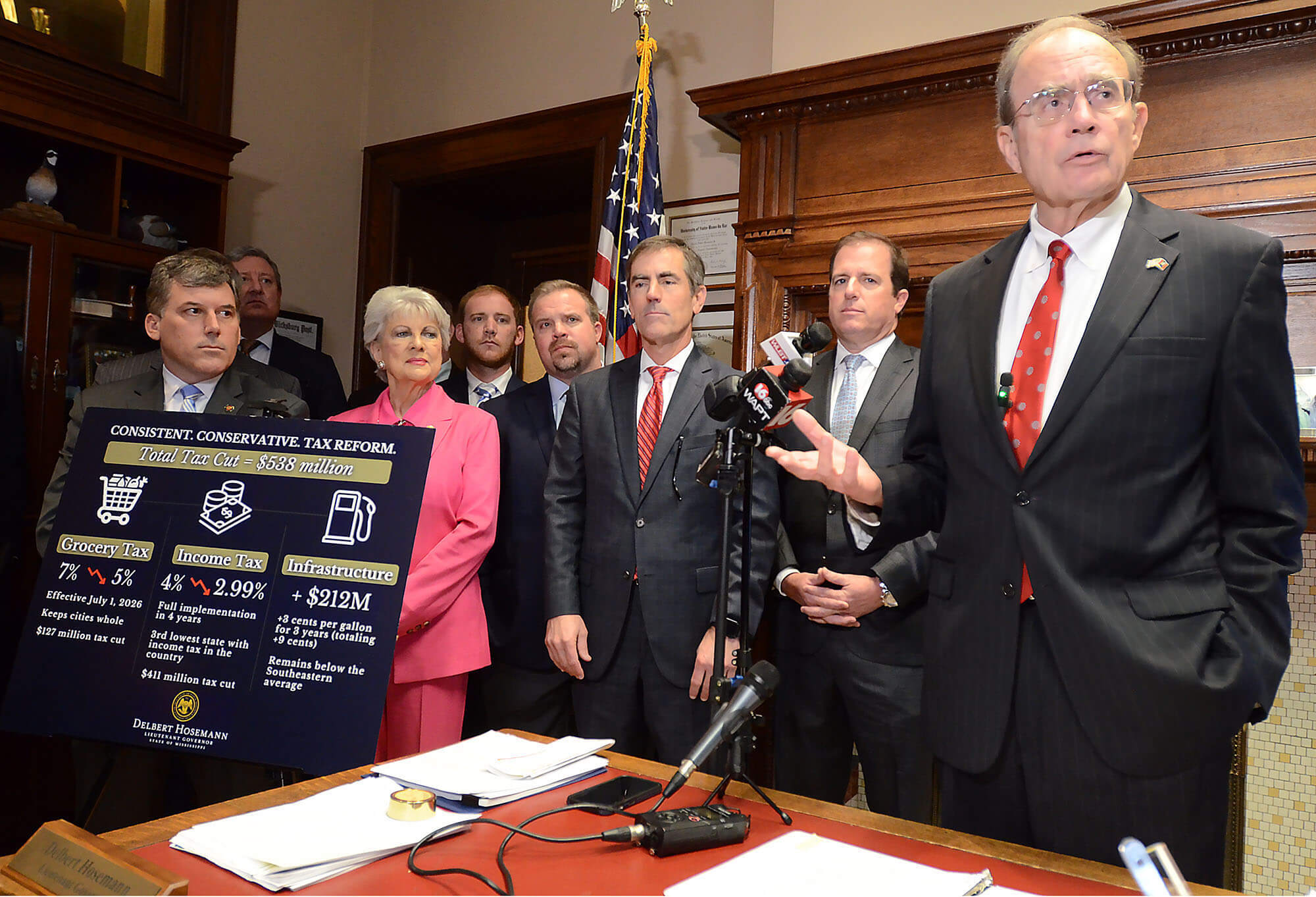

The House on Wednesday voted to end what had become a futile legislative session without passing a budget to fund state government, for the first time in 16 years. The Senate is expected to do the same on Thursday.
The decision to leave the Capitol without funding government services means Gov. Tate Reeves would have to call legislators into a special session before government funding runs out on June 30 to avoid a shutdown. The governor could, based on previous legal rulings and opinions, run some agencies at least temporarily but many would be shuttered without a state budget in place.
House Speaker Jason White and Lt. Gov. Delbert Hosemann, both Republicans, blamed each other for failing to come to the negotiating table on ironing out a final $7 billion state budget.
“They have ignored the deadlines, failed to show up repeatedly, taken their marbles home at least twice, and given us conflicting statements every other time,” Hosemann said of the House.
White, however, said he told Hosemann in early January that the House would not craft a “hurried budget” late in the session.
Reeves, who previously helped write the state budget when he served two terms as lieutenant governor, has not said anything publicly about the Legislature’s failure to adopt a budget and has not indicated when he might force them back in a special session.
The 2025 session has been characterized by bitter GOP infighting between White and Hosemann and their leadership teams, with the two chambers killing much of each other’s legislative priorities.
House Minority Leader Robert Johnson of Natchez said the Republican bickering this session is not good for the state, and he hopes GOP leaders in the House and Senate can learn to get along. He said they should have stayed and passed a state budget, not relied on the governor to force them back into session.
“I think the situation is just unfortunate,” Johnson said. “It appears to me, after being in the Legislature for 30 years, that problems like this are more about personalities than actual issues. They need to step back, set aside their personal feelings and look at what’s best for the state of Mississippi instead.”
Even though the House finally accomplished its long-championed policy of eliminating the income tax, lawmakers might have to correct some of the mistakes in the legislation in the future.
The House began to seethe after it felt the Senate was dragging its feet on proposing a plan to eliminate the income tax, after it killed most of White’s K-12 public education reforms and refused to pass a bill legalizing mobile sports betting.
When the Senate finally passed a measure to eliminate the income tax, it included typos that eliminated the tax much quicker than the Senate intended. Instead of pointing out the error to the Senate, the House pounced on it, passed the flawed bill and sent it to the governor. Normally, each side would work with the other to correct known mistakes in legislation.
The Senate felt burned by the House’s move and accused House leaders of negotiating in bad faith. Those frustrations carried over into trying to reach agreement on the state’s $7 billion general fund budget.
The House leadership had vowed to avoid crunching budget numbers late into the night on “conference weekend” Saturday, as is tradition and the deadline for filing agreements. Many lawmakers have for years complained about the rushed budget setting, saying they don’t have time to vet or sometimes even read spending bills, and it has resulted in major mistakes in the past. White has vowed to end the practice.
The Senate, however, said they tried to iron out spending bills with their House counterparts during the week leading up to the conference weekend deadline, but they were initially met with silence.
Still, House leaders met with Senate budget writers during the middle of last week to try to agree on at least some of the budget bills. But Hosemann said at one point on Friday night, the House walked out of the negotiations.
Another point of contention between the two chambers is that Senate negotiators pledged not to agree to spend excess cash on lawmakers’ pet projects, including in an annual “Christmas Tree” bill. Lawmakers typically pass such a bill, usually ranging from $200 million to $400 million on earmarked projects across the state. Some lawmakers have complained this “pork” spending based on politics is an unfair way to spend money on projects in a poor state with many infrastructure needs.
The Legislature has not left Jackson without setting at least most of the state budget since 2009, when then-Gov. Haley Barbour had to force them back to Jackson to avoid a government shutdown.
But that 2009 instance was when Democrats still had a slight majority in the House and Senate, with Republican Lt. Gov. Phil Bryant presiding over the Senate and Democratic Speaker Billy McCoy leading the House. Now, Republicans have a supermajority in both chambers.
The House on Wednesday afternoon made a final attempt to revive negotiations by passing a measure to revive budget bills and extend the session. But shortly after the House passed the proposal, the Senate ended business for the day without considering the House offer.
Sen. Angela Burks Hill, R-Picayune, is one of a handful of more conservative senators who had opposed the tax overhaul compromise with the House and was angered by its passage due to typos. She also was displeased with the House’s failure to show up on conference weekend to negotiate a budget and said she was “100% opposed” to passing a resolution to extend the session and renew negotiations with the House.
“That’s what happens when you play Napoleon,” Hill said. When asked to whom she was referring as Napoleon, she said, “You can figure it out.”
The decision to leave the state Capitol without a budget comes in the middle of unpredictability with the federal government, where President Donald Trump’s administration is cancelling hundreds of millions of dollars in federal grants and other funding to states.
Mississippi is one of the most federally dependent states in the nation.
State Health Officer Daniel Edney told lawmakers earlier this week that the federal government has cancelled around $230 million in federal grants to the state Department of Health.
And Hosemann told reporters on Wednesday that State Superintendent of Education Lance Evans informed him that around $190 million in education funding was frozen, though the lieutenant governor did not reveal the specific details of those funds.
Mississippi Today‘s Michael Golberg and Geoff Pender contributed to this report.
The post Mississippi Legislature ends 2025 session without setting a budget over GOP infighting appeared first on Mississippi Today.
- Scott Colom raised most money, but Cindy Hyde-Smith has most cash before March primary - February 21, 2026
- Patients face canceled surgeries and delayed care amid UMMC cyberattack - February 20, 2026
- Goal is ‘better alignment, not bigger government’ for Mississippi tourism - February 20, 2026